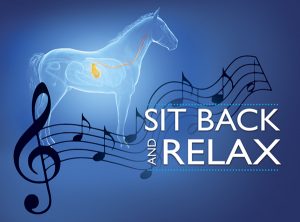Effect of Music on Response to Sudden and Unexpected Stimuli
From Equine Science Update:
The living conditions imposed on horses inevitably expose them to stress-inducing situations.
Music appears to be a promising tool for managing such stress, although its benefits may diminish with repeated exposure.
A study by Camille Eyraud and colleagues aimed to determine whether music could mitigate horses’ reactions to unexpected stimuli and whether playing the same music daily reduces its effectiveness.
The research in, published in the International Journal of Equine Science, involved three groups of 12 horses, each led along a route with potentially stressful stimuli for 10 consecutive days. Each group wore headphones and was subjected to one of three conditions: a “music” condition with the same music track played, a “noise” condition with pink noise.
The authors explain: “Pink noise is a random signal with constant energy in the octave bands and is therefore weighted according to the properties of the human audiogram (and, by extension, also those of horses.)”
“The music was played directly into the horse’s outer ear using an “audio cap.” This is a traditional earcap equipped with a pair of earphones in front of the pinnae and a pocket to hold a small MP3 player between the two ears.”
The findings indicated that music had a calming effect on both horse behaviour and heart rate in response to visual stimuli. Interestingly, the parameters for the pink noise condition were intermediate between those of the music and no-music conditions.
Regarding the potential loss of music’s effectiveness with repeated exposure, the study showed that music continued to mitigate stress-related behaviours effectively for up to seven consecutive exposures, although this effect was not consistent every day.
In conclusion, music can enhance human-horse interactions by reducing horses’ stress in unexpected situations. The study also showed that the use of music did not interfere with the horses’ awareness of and response to environmental noise, which is crucial in case of real danger.
However, the researchers suggest that to maintain music’s efficiency, it should be used sparingly to target specific, time-limited events. They question whether playing music continuously throughout the day, as is often done in stables, might be counterproductive.
However, the researchers suggest that to maintain music’s efficiency, it should be used sparingly to target specific, time-limited events. They question whether playing music continuously throughout the day, as is often done in stables, might be counterproductive.
They recommend further research to understand the mechanisms behind this effect and to ensure its safe and consistent application in practical settings.
For more details, see:
Eyraud, C., Valenchon, M., Cairo, M., Adam, O. and Petit, O. 2024.
Can Repeated Exposure to Music Mitigate Horses’ Reactions to Sudden and Unexpected Stimuli?.
International Journal of Equine Science. 3, 1 (Apr. 2024), 58–65.
https://rasayely-journals.com/index.php/ijes/article/view/102













